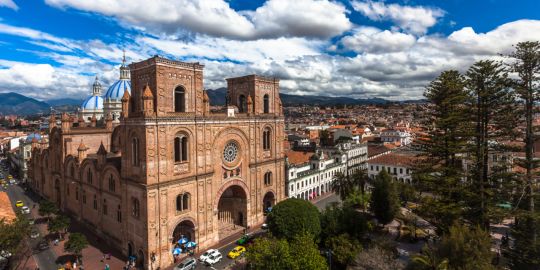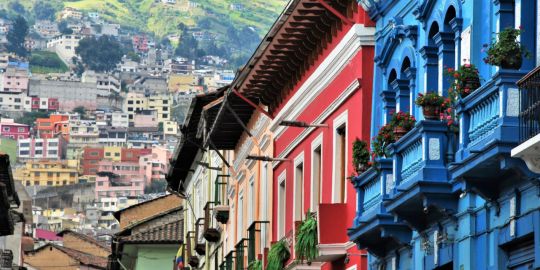Joel and Robin from Kansas City just posted on the New Members thread.
They want to rent and eventually buy a condo at the Ecuador oceanfront.
Frankly, given the events of the last two months, I would counsel anybody to rent only, not buy at the EC beaches.
El Niño storms have been battering coastal communities. The year-round warmth means that mosquitoes carrying Zika and other diseases may be present in some communities.
And now we have the earthquake that has claimed hundreds of lives in major coastal-area cities including Manta, Guayaquil, Pedernales and Portoviejo.
So, we will welcome you to Ecuador, Joel and Robin. But if your heart's set on the beach, consider a long-term prospect of being renters, not buyers.
That will give you the flexibility you need down the road. Re-selling a property in a distressed location is hard enough anywhere. In Ecuador, selling in a zone that can be affected by El Niño flooding or an earthquake would be even more difficult.
You can find great rental properties at Ecuador's beaches.
Why buy?
cccmedia
2016: Does It Make Any Sense For Joel & Robin to Buy a Beach Condo?
Although it makes sense to rent Vs. buying, I'd like to add to the advise, if there is an "opportunity" to buy at a lower price than the average market price, do it.
I did it and have no regret.
Luckily the Tonsupa area was not affected by the last "terra movement".
Marco
marcomueses wrote:Although it makes sense to rent Vs. buying, I'd like to add to the advise, if there is an "opportunity" to buy at a lower price than the average market price, do it.
I did it and have no regret.
Luckily the Tonsupa area was not affected by the last "terra movement".
Marco
Marco,
Is your building "earthquake-resistant?" If so how do you know?
The condominium I live in is 5 yrs. old, composed of 13 bungalows. We suffered no damages at all. Tonsupa was "spared".
I have no idea if these bungalows were built with provisions to face tremblors, I guess we were lucky the epicentre was located about 200 km. south of here.
MM
I saw a photo on twitter today of a wrecked beach house that had a real gringo look to it. A stand alone 2-story, lots of sliding glass doors onto balconies, new construction. Shaken, broken, and leaning.
My first thought was that it's a total loss. Homeowners insurance? Good luck.
Somebody's dream retirement home *investment* is now probably a $100k of nothingness. Gone.
Very risky business.
Affordable Insurance is always available if desired.
Marco
In light of the recent tragedy in Ecuador. Happened to stumble upon this article from Scientific American.
http://www.scientificamerican.com/artic … 3A+News%29
Here's a couple of quotes from the article.
"The large earthquake that jolted Ecuador on Saturday, April 16, reached magnitude 7.8. The shaking occured in a fault region that has unleashed much bigger quakes in the past, including the largest earthquake ever recorded by scientific instruments, according to the U.S. Geological Survey."
"It is not the only large jolt that has shaken the region in the past. The geological survey, on its web site, notes that seven magnitude 7 or greater earthquakes have occurred within 250 km of Saturday's quake since 1900. On January 31st, 1906 an 8.3 shaker rumbled through this Pacific-South American collision zone 90 km to the northeast of Saturday's quake. It ripped the seam between the rocks open for about 400-500 km, and the undersea movements produced a tsunami that killed between 500 and 1,500 people."
That's some pretty scary stuff. 7 earthquakes of 7 magnitude or higher since 1900. That's about 1 every 17 years.
marcomueses wrote:Affordable Insurance is always available if desired.
Marco
It's affordable, but I wouldn't trust it.
If an insurance company in Ecuador issues a (bogus) denial on your claim, who ya gonna call?
There's no English-speaking State Insurance Commission.
Want to take the insurer to court with your Spanish-speaking attorney? I'm not betting on your side prevailing to your satisfaction or the benefit of your pocketbook. I'm not guessing the case will even be decided for years, especially if thousands of other earthquake victims are suing.
IMO, do not buy in historically-dangerous earthquake zones unless you can accept a total financial loss.
cccmedia
cccmedia, I wonder if you have any handy references for "historically-dangerous earthquake zones" on the coast?
A casual look around gives Bahia numerous big quakes. Manta several. It looks to me like the area between the Colombia border and Manta has had the most trouble, and south on the coast from there it diminishes.
This event has really got me to thinking about where on the coast I might want to resettle. Farther south is looking more better.
Right now I'm trying to read a 10 page PDF called "Seismic Hazard Along the Southern Coast of Ecuador" which is way beyond my layman's understanding.
gardener1 wrote:cccmedia, I wonder if you have any handy references for "historically-dangerous earthquake zones" on the coast?....
This event has really got me to thinking about where on the coast I might want to resettle. Farther south is looking more better.
That could be a major research project.
You might start with the Scientific American article posted online titled "Ecuador Quake is on the Fault That Generates Monster Shakers” and its link to the U.S. Geological Survey. www.scientificamerican.com
By the way, Cuenca was not affected by the weekend earthquake and has not had problems from seismic activity in the recent several centuries.
cccmedia
cccmedia wrote:gardener1 wrote:cccmedia, I wonder if you have any handy references for "historically-dangerous earthquake zones" on the coast?....
This event has really got me to thinking about where on the coast I might want to resettle. Farther south is looking more better.
That could be a major research project.
You might start with the Scientific American article posted online titled "Ecuador Quake is on the Fault That Generates Monster Shakers” and its link to the U.S. Geological Survey. www.scientificamerican.com
By the way, Cuenca was not affected by the weekend earthquake and has not had problems from seismic activity in the recent several centuries.
cccmedia
Probably not exactly what you're looking for gardener, but the USGS has a ton of good information that might be worth browsing through, and seeing if you can find what you're looking for.
http://earthquake.usgs.gov
gardener1 wrote:cccmedia, I wonder if you have any handy references for "historically-dangerous earthquake zones" on the coast?
Maybe go in the direction of reading about the earth's tectonic plate movement. The Nazca plate borders the western edge of South America and moves toward the coast. Also, an identified "hot spot" in the Pacific off the coast of Ecuador and Colombia apparently is where this plate collides with the Cocos Plate and the Pacific Plate. To my unscientific mind, this must be the explanation for the frequent off-shore earthquakes felt in Panama and Colombia and of course Ecuador.
https://en.wikipedia.org/wiki/Nazca_Plate
This site may be helpful. Has a history of the largest earthquakes along the Ecuador Coast. Can also play around a bit, and search for earthquakes through South America. Am not a geologist, nor a geography major, but from just looking at the maps of decent size earthquakes along the coast of South America, it looks like pretty much like there isn't really a perfect place to be particularly safe if a big quake hits. Kind of seems to be all up and down the coast.
http://earthquaketrack.com/r/coast-of-ecuador/biggest
j600rr wrote:This site may be helpful....
looking at the maps of decent size earthquakes along the coast of South America, it looks like pretty much like there isn't really a perfect place to be particularly safe if a big quake hits. Kind of seems to be all up and down the coast.
http://earthquaketrack.com/r/coast-of-ecuador/biggest
Looking at these maps, I'd say the whole northern coast of Ecuador is especially problematic for earthquakes, from Guayas province on up.
Looking at the Pacific Ring of Fire map that Liliya Bykova just posted at her Day in Quito website, I'd say it's clear that buying a home anywhere on South America's Pacific Coast is a bad idea. If you must live there, renting won't save you from harm's way. But by renting you'll avoid the real-estate financial hit if a quake ever comes your way. Map at: dayinquito.blogspot.com
cccmedia
Bhavna at the Home Office has correctly referred Joel and Robin to this thread after they asked about home insurance, at the New Members thread.
First off, don't buy in earthquake prone areas on the Ring of Fire that includes the whole Ecuador coast.
Second, I wouldn't expect any legitimate insurance company to offer policies at a reasonable price and pay claims, especially for future seismic-related damage over there, going forward.
Third, don't even think about buying property in Ecuador until you have rented in the target area for a year.
cccmedia in Quito









